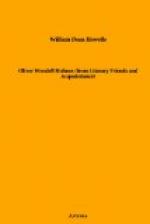III.
He seemed not to mind, however, climbing to the little apartment we had in Boston when we came there in 1866, and he made this call upon us in due form, bringing Mrs. Holmes with him as if to accent the recognition socially. We were then incredibly young, much younger than I find people ever are nowadays, and in the consciousness of our youth we felt, to the last exquisite value of the fact, what it was to have the Autocrat come to see us; and I believe he was not displeased to perceive this; he liked to know that you felt his quality in every way. That first winter, however, I did not see him often, and in the spring we went to live in Cambridge, and thereafter I met him chiefly at Longfellow’s, or when I came in to dine at the Fieldses’, in Boston. It was at certain meetings of the Dante Club, when Longfellow read aloud his translation for criticism, and there was supper later, that one saw the doctor; and his voice was heard at the supper rather than at the criticism, for he was no Italianate. He always seemed to like a certain turn of the talk toward the mystical, but with space for the feet on a firm ground of fact this side of the shadows; when it came to going over among them, and laying hold of them with the band of faith, as if they were substance, he was not of the excursion. It is well known how fervent, I cannot say devout, a spiritualist Longfellow’s brother-in-law, Appleton, was; and when he was at the table too, it took all the poet’s delicate skill to keep him and the Autocrat from involving themselves in a cataclysmal controversy upon the matter of manifestations. With Doctor Holmes the inquiry was inquiry, to the last, I believe, and the burden of proof was left to the ghosts and their friends. His attitude was strictly scientific; he denied nothing, but he expected the supernatural to be at least as convincing as the natural.




